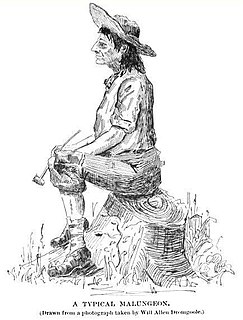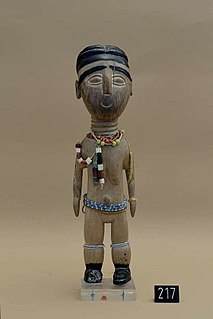Related Research Articles

Charadriiformes is a diverse order of small to medium-large birds. It includes about 350 species and has members in all parts of the world. Most charadriiform birds live near water and eat invertebrates or other small animals; however, some are pelagic (seabirds), others frequent deserts, and a few are found in dense forest.
The Lemba, wa-Remba, or Mwenye are a Bantu ethnic group which is native to Zimbabwe and South Africa, with smaller, little-known branches in Mozambique and Malawi. According to Tudor Parfitt, then Professor of Modern Jewish Studies at the University of London, in the 1980s when he did his first fieldwork among the Lemba, in South Africa, Zimbabwe and Malawi they numbered an estimated 50,000. They speak the Bantu languages spoken by their geographic neighbours and resemble them physically, but they have some religious practices and beliefs similar to those in Judaism and Islam. According to Parfitt the Lemba claimed once to have had a book which contained their traditions but it was lost.

Ọdịnala, also Ọdịnanị, Ọdịlalị or Ọdịlala, comprises the traditional religious practices and cultural beliefs of the Igbo people of southern Nigeria. Ọdịnanị has monotheistic and panentheistic attributes, having a single God as the source of all things. Although a pantheon of spirits exists⸺these being Ala, Amadiọha, Anyanwụ, Ekwensu, Ikenga, these are lesser spirits prevalent in Ọdịnanị expressly serving as elements of Chineke, the supreme being or high God. Chineke is a compound word encompassing the concept of chí is the creator (nà) is a verb meaning 'that' while ékè means create. Chineke therefore means the Creator or the God that created all things.

Ishmael, a figure in the Hebrew Tanakh, the Christian Old Testament, and the Quran, was the first son of Abraham according to the Bible. Ishmael was born to Abraham and the Egyptian Hagar (Hājar). According to the Genesis account, he died at the age of 137.

Melungeons is a term for numerous groups of people of the Southeastern United States who descend from European and Sub-Saharan African settlers. Historically, the Melungeons were associated with settlements in the Cumberland Gap area of central Appalachia, which includes portions of East Tennessee, Southwest Virginia, and eastern Kentucky.
A clan is a group of people united by actual or perceived kinship and descent. Even if lineage details are unknown, clan members may be organized around a founding member or apical ancestor. Clans, in indigenous societies, tend to be exogamous, meaning that their members cannot marry one another. Clans preceded more centralized forms of community organization and government, and exist in every country. Members may identify with a coat of arms or other symbol to show that they are an independent clan. The kinship-based bonds may also have a symbolic ancestor, whereby the clan shares a "stipulated" common ancestor that is a symbol of the clan's unity. When this "ancestor" is non-human, it is referred to as a totem, which is frequently an animal.

In anthropology, kinship is the web of social relationships that form an important part of the lives of all humans in all societies, although its exact meanings even within this discipline are often debated. Anthropologist Robin Fox states that "the study of kinship is the study of what man does with these basic facts of life – mating, gestation, parenthood, socialization, siblingship etc." Human society is unique, he argues, in that we are "working with the same raw material as exists in the animal world, but [we] can conceptualize and categorize it to serve social ends." These social ends include the socialization of children and the formation of basic economic, political and religious groups.

The Dogon are an ethnic group indigenous to the central plateau region of Mali, in West Africa, south of the Niger bend, near the city of Bandiagara, and in Burkina Faso. The population numbers between 400,000 and 800,000. They speak the Dogon languages, which are considered to constitute an independent branch of the Niger–Congo language family, meaning that they are not closely related to any other languages.
In ancient Rome, a gens, plural gentes, was a family consisting of individuals who shared the same nomen and who claimed descent from a common ancestor. A branch of a gens was called a stirps. The gens was an important social structure at Rome and throughout Italia during the period of the Roman Republic. Much of individuals' social standing depended on the gens to which they belonged. Certain gentes were classified as patrician, others as plebeian; some had both patrician and plebeian branches. The importance of membership in a gens declined considerably in imperial times, although the gentilicium continued to be used and defined the origins and dynasties of Roman emperors.
Commonly, "cousin" refers to a "first cousin", a relative whose most recent common ancestor with the subject is a grandparent. More generally, in the lineal kinship system used in the English-speaking world, a cousin is a type of familial relationship in which two relatives are two or more familial generations away from their most recent common ancestor.

The Ewe people are a Gbe ethnic group. The largest population of Ewe people is in Ghana, and the second largest population in Togo. They speak the Ewe language which belongs to the Gbe family of languages. They are related to other speakers of Gbe languages such as the Fon, Gen, Phla Phera, and the Aja people of Togo and Benin.
The Hupda are an Amazonian indigenous people who live in Brazil and Colombia. They speak the Hup language.

In human society, family is a group of people related either by consanguinity or affinity. The purpose of families is to maintain the well-being of its members and of society. Ideally, families would offer predictability, structure, and safety as members mature and participate in the community. In most societies, it is within families that children acquire socialization for life outside the family, and acts as the primary source of attachment, nurturing, and socialization for humans. Additionally, as the basic unit for meeting the basic needs of its members, it provides a sense of boundaries for performing tasks in a safe environment, ideally builds a person into a functional adult, transmits culture, and ensures continuity of humankind with precedents of knowledge.

The Baltic Finnic peoples, Baltic Sea Finns, Baltic Finns, sometimes also Western Finns, often simply referred to as the Finnic peoples, are Finno-Ugric peoples inhabiting the Baltic Sea region in Northern and Eastern Europe who speak Finnic languages, including the Finns proper, Estonians, Karelians, Veps, Izhorians, Votes, and Livonians, as well as their descendants worldwide. In some cases the Kvens, Ingrians, Tornedalians and speakers of Meänkieli are also included separately rather than as a part of Finns proper.

Chinese ancestor worship or Chinese ancestor veneration, also called the Chinese patriarchal religion, is an aspect of the Chinese traditional religion which revolves around the ritual celebration of the deified ancestors and tutelary deities of people with the same surname organised into lineage societies in ancestral shrines. Ancestors, their ghosts, or spirits, and gods are considered part of "this world", that is, they are neither supernatural nor transcendent in the sense of being beyond nature. The ancestors are humans who have become godly beings, beings who keep their individual identities. For this reason, Chinese religion is founded on veneration of ancestors. Ancestors are believed to be a means of connection to the supreme power of Tian as they are considered embodiments or reproducers of the creative order of Heaven.
The Chamba people are a significant ethnic group in the north eastern Nigeria. The Chamba are located between present day Nigeria and Cameroon. The closest Chamba neighbours are the Mumuye, the and the Jukun and Kutep people. In Cameroon, the successors of Leko and chamba speakers are divided into several states: Bali Nyonga, Bali Kumbat, Bali-Gham, Bali-Gangsin, and Bali-Gashu. The Basari people of Togo and Ghana also go by the name Chamba, but they are ethnically distinct. The Chamba are identified through their own language, beliefs, culture, and art.
A gens was a family in Ancient Rome in which all of the members typically bore the same nomen and claimed descent from a common ancestor.
The Langha are a Muslim community found in the states of Rajasthan and Gujarat in India. They are unrelated to the Langah clan of southern Punjab province in Pakistan.

The Iatmul are a large ethnic group of about 10,000 people inhabiting some two-dozen politically autonomous villages along the middle Sepik River in Papua New Guinea. The communities are roughly grouped according to dialect of the Iatmül language as well as sociocultural affinities. The Iatmul are best known for their art, men's houses, male initiation, elaborate totemic systems, and a famous ritual called naven, first studied by Gregory Bateson in the 1930s. More recently, Iatmul are known as a location for tourists and adventure travellers, and a prominent role in the 1988 documentary film Cannibal Tours.
Detailed anthropological and sociological studies have been made about customs of patrilineal inheritance, where only male children can inherit. Some cultures also employ matrilineal succession, where property can only pass along the female line, most commonly going to the sister's sons of the decedent; but also, in some societies, from the mother to her daughters. Some ancient societies and most modern states employ egalitarian inheritance, without discrimination based on gender and/or birth order.